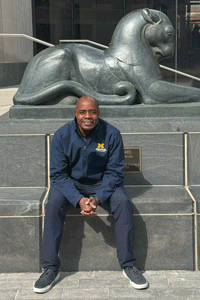JD Jordan, Desktop Support Manager for the Executive IT team and Security Unit Liaison (SUL), has an office in the Ruthven building and supports the IT needs of the executives located there. In his role as SUL, an important responsibility is ensuring cybersecurity awareness and preparedness against phishing scams.
When asked if he ever visited the Natural History Museum when it was housed in Ruthven, JD had a chance to joke about his time as a U-M student. As he tells it, “The funny story is that I have never been in this building until I worked in this building. I was a student here. I lived in Alice Lloyd for, what, two years? I walked around this building a thousand times. I was in North Hall right across the way when I was in Air Force ROTC. I basically spent more time in this little area than anywhere else during all of my time as a student. I would take pictures with the pumas. I just never walked in. But yeah, nope. I was that horrible student who was more about going to Charlie's than going to the Natural History Museum.”
When JD was a student, he wanted to be an Air Force officer. And the Air Force told him that if you want to commission as an officer, you need to graduate with a computer science degree. As JD recalled, “I love technology. I love to play with technology and to tinker and figure things out. But I don't want to make the stuff. I'll just let you know, I hated computer science. I quickly learned that in my first year of EECS 100.”
When he was placed as an Air Force pilot as a junior, he asked “Hey, do I still need to do this computer science thing?” The ROTC said that to be a pilot he only needed to graduate. JD had already completed most of the prerequisites for a History degree, so he focused on that and loved it. In his words, “It was something that satisfied my thirst for understanding why things are.” When JD graduated, he went into the Air Force and started undergraduate pilot training. He remembers, “being okay at it, but not very good because my heart just wasn't in it.” JD decided on a change, and when the Air Force saw he had years of computer science credits, they put him in communications/IT. “So basically, full circle, I ended up just as if I would have finished with a computer science degree. The universe corrected itself and put me back where I was supposed to be all along.”
In terms of his SUL role, the IA Notices about phishing scams are super helpful for JD because he recrafts those messages to make them a bit more pertinent to his users. Then he blasts them out and says, ”Hey, be careful. This is something that ITS IA has identified as a threat.” JD knows his emails help people because they tell him, “Oh, wow, I got that email and I did this.” JD takes care to communicate to his users about emerging threats and appropriate action. In his words, “The most important thing is they become a little bit more aware and vigilant in their daily computing lives.”
Within Ruthven, JD’s neighborhood IT structure is just like any other ITS unit. People submit tickets and his team responds to them. JD says that “A difference for us is that the people we support, the president, the regents, the majority of the executive officers and their staff, are the top echelon of leadership at the university. So one of the things that we keep in mind is that everybody's important. Not just because they are members of the university community, but these are all people that have huge responsibilities and huge organizations behind them. And so our charge is to make sure that they get the best service possible, not just because they're ‘that person,’ but because if they can't do their job, it trickles down greatly. If you're a vice president of a huge organization and you can't do what you need to do, then the people you lead can't do their jobs.” JD’s team prioritizes speed and efficiency because problems can get big quickly and can affect a lot of people.
On a personal note, JD calls himself a “big kid” because he loves things like Rubik's cubes and Legos. He also spends a lot of time with his kids who are in sports. His oldest played NFL flag football, tackle football, travel baseball, and travel soccer this year, while his youngest takes swim classes and plays soccer. When he has time to himself, JD loves watching science fiction, and adds, “I love stories that just kind of grab you and then have a little bit of a twist.”

